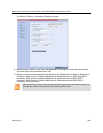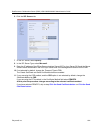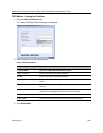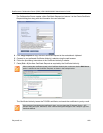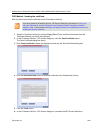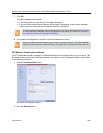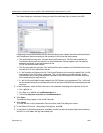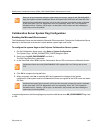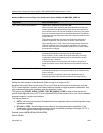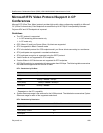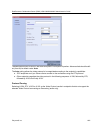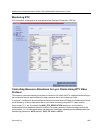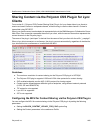
RealPresence Collaboration Server (RMX) 1500/1800/2000/4000 Administrator’s Guide
Polycom®, Inc. 1048
Additional MS Environment Flags in the Collaboration Server MCMS_PARAMETERS_USER Tab
Setting the audio protocol for the Microsoft Client running on a single core PC
By default, Microsoft Office Communicator R2 or Lync Clients are connected to conferences using the
G.722.1 audio algorithm. However, when these clients are hosted on single processor workstations, they
may experience audio quality problems when this algorithm is used.
The System Flag FORCE_AUDIO_CODEC_FOR_MS_SINGLE_CORE is used to force the use of a
specific Audio algorithm such as G.711 when a Microsoft Office Communicator R2 or Lync Client is detected
as being hosted on a single core processor.
This flag can be set to:
● AUTO – No forcing occurs and the Collaboration Server negotiates a full set of Audio algorithm during
capabilities exchange.
● G711A/U or G722 – Set this flag value according to the hosting workstation capabilities. If the
Collaboration Server detects single core host during capabilities exchange it will assign a G. 711 or
G.722 Audio algorithm according to the flag value.
Possible values: AUTO, G711A, G711U, G722
Default: G711A
Flag Name Value and Description
SIP_FREE_VIDEO_RESOURCES Default value in Microsoft environment: NO.
When set to NO, video resources that were allocated to participants
remain allocated to the participants as long as they are connected to
the conference even if the call was changed to audio only. The system
does not allocate the resources to other participants ensuring that the
participants have the appropriate resources in case they want to return
to the video call.
The system allocates the resources according to the participant’s
endpoint capabilities, with a minimum of one CIF video resource.
When this flag is set to YES, video ports are dynamically allocated or
released according to the in the endpoint capabilities. For example,
when an audio Only call is escalated to Video and vice versa or when
the resolution is changed.
SIP_FAST_UPDATE_INTERVAL_ENV Default setting is 0 to prevent the Collaboration Server from
automatically sending an Intra request to all SIP endpoints.
Enter n (where n is any number of seconds other than 0) to let the
Collaboration Server automatically send an Intra request to all SIP
endpoints every n seconds.
It is recommended to set the flag to 0 and modify the frequency in
which the request is sent at the endpoint level (as defined in the next
flag).
SIP_FAST_UPDATE_INTERVAL_EP Default setting is 0 to prevent the Collaboration Server from
automatically sending an Intra request to Microsoft OC endpoints only,
every 6 seconds.
Enter the number of seconds in which the Collaboration Server
automatically sends Intra requests to Microsoft OC endpoints only.



